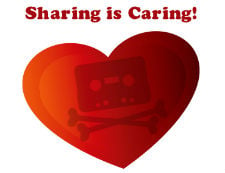A Spanish judge came to an interesting conclusion in a case dealing with a seller of pirated copies. According to the judge the defendant doesn’t have to pay compensation to the rightsholders because it is not possible to determine to what extent piracy actually decreases sales. On the contrary, the judge suggests that piracy may even boost sales.
 Anyone who says that piracy is only helping or hurting content creators is wrong.
Anyone who says that piracy is only helping or hurting content creators is wrong.
Piracy has a different effect in each unique case. Not only does it differ between the gaming, music, book and movie industries, but also between the relative popularity of the artists and the characteristics of their audiences.
As we’ve pointed out repeatedly in the past, there are plenty of cases where piracy may have a positive effect on sales. Research has shown that “pirates” are the music industry’s best customers, something EMI’s new music boss Douglas Merrill confirmed earlier this year.
“For example, there’s a set of data that shows that file sharing is actually good for artists. Not bad for artists. So maybe we shouldn’t be stopping it all the time. I don’t know,” Merrill said at the time.
Merrill’s conclusions are quite unique coming from a music industry boss, but he is certainly not alone. The same conclusion was reached by people in the anime and book industries in recent months.
The conclusion that piracy is not detrimental to sales has not gone unnoticed by the courts either. In a recent ruling in Spain a local judge noted that it’s impossible to determine the damages a seller of pirated copies had caused, because it’s unclear how many people would have bought the products for the original price.
“It is not possible to determine the damage and corresponding compensation due to loss of benefits to the rightsholder, for the simple reason that customers of pirated copies of music and movies, when making the purchase of pirated copies, externalize their decision not to be customers of music and movies as originals, so there is no profit that could have been gained.”
“In other words, those customers either buy a pirated copy at a low price or they don’t buy an original at a price between 15 and 20 Euros,” the judge added.
On the contrary, instead of hurting the income of copyright holders piracy may actually boost sales, the judge noted.
“In any case, reversing the legal argument, it is conceivable that a customer, after hearing or viewing the pirated copy, may decide to purchase the original, finding it to their taste, so that the sale of pirated copies, far from harming, benefits the market for original items.”
“I declare that there is no harm for which compensation is required,” the judge concluded in her verdict.
Although there are several studies and anecdotes that arrive at a similar conclusion, this is the first time that a judge has brought this up in a verdict. And rightly so.
In a time where people’s rights are stripped to protect the interests of a few multi-million dollar entertainment industry companies, a more realistic, balanced and independent look at the “real” consequences of piracy in individual cases should be encouraged.
















No comments:
Post a Comment